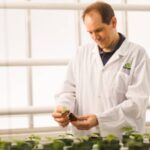Going Organic — Certify or Not?
Over the past year, the organic growing community has been presented with something of a conflict of identity. A longstanding debate about whether hydroponic and aeroponic growers should be able to attain organic certification finally came to a head with the National Organic Standards Board (NOSB) putting it to a vote. In what came as a surprise decision to many, myself included, the NOSB voted to allow hydroponics and other soil-less growers to keep the label.
However, the vote has definitely not settled the issue nor brought organic growers back together. Preceding the vote, vocal groups of organic farmers held rallies demanding the board “keep soil in organics,” claiming that soil-less growers would sully the organic label and render it meaningless, and many even threatened to drop their certification altogether should the NOSB vote to allow certification of soil-less growers.
WHY CERTIFY?
On a fundamental level, this argument seems to be begging the question: What exactly is the intent of organic certification? I’d like to state here that I fully support organic agriculture. I grow certified organic plants, I buy many organic products for my own use, and I wholeheartedly support organic farmers. That being said, I feel it’s imperative to discuss a few of the shortcomings of the current National Organic Program standards.
For starters, there is widespread confusion and/or misinterpretation of what “certified organic” means among consumers. Many consumers erroneously believe that “organic” automatically means “no-spray.” While the organic industry is definitely not propagating this misunderstanding, it is not exactly going out of its way to dispel it. After all, if some customers hold an even rosier idealized image of organic practices, why not let them keep it? Similarly, the term “organic” has been largely conflated with ideas of sustainability, low environmental impacts and smaller carbon footprints.
IMPROVING CURRENT STANDARDS
I would gladly assert that in my experiences the perceived environmental benefits of organic agriculture are often real, and further that organ

ic producers are more likely to value and pursue environmental sustainability. That being said, my greatest frustration as an organic grower is that, despite its own claims, organic standards are not specifically designed to pursue environmental sustainability, to minimize ecological impacts, or to promote incremental positive change in our agricultural systems. Furthermore, organic requirements for materials, certification costs and record keeping place a huge financial burden on growers. In short, I fear that the lofty goal of creating an environmentally sound and sustainable agricultural system has been supplanted with the goal of merely satisfying the requirements for the label.
I definitely do not have the solutions to this conundrum, and it is not my intent to cast a negative light on the organic industry. As I’ve said, I really do believe in it and support it; I just know that it is possible to create a better system for growers, consumers and the planet, and I’m frustrated. Everyday I face the economic reality that if there wasn’t an independently verified “Organic Certified” label available, I’d have no clear way to demonstrate the added value of my growing practices, nor to demand the price premium those practices necessitate. Personally, I would love to see a marketplace and consumers that could understand a spectrum of different growing practices, but for now we seem quite stuck between “organic” and “conventional.”
WHERE DO WE GO FROM HERE?
While I don’t necessarily have the answers, I do have an idea that I think could serve as a framework for either improving organic standards or for creating an entirely new system. I believe that any system that truly intends to encourage farmers to make decisions that move their agricultural systems toward sustainability must recognize the value of incremental positive changes.
If, for example, every farmer was to reduce their pesticide use by 50 percent, the positive effect on the environment would be tremendous. Unfortunately, there currently exists no system to incentivize this behavior. The current organic standard is binary; you are either certified organic or you are not, so there is absolutely no incentive to make any changes short of committing 100 percent.
Additionally, there is no incentive for a farmer to pursue any changes that go beyond the scope of organic certification. A graded system could allow consumers much greater insight into the specific practices of the farms they support, and reward farmers for improvements that currently go completely unnoticed.
I sincerely hope there is still room to make changes to organic standards, and I hope that the greenhouse industry can be involved in the conversation. After all, there may yet come a time when greenhouse growers find themselves pushed out from under the organic umbrella, and I wonder if there is any plan B.


 Video Library
Video Library 



















